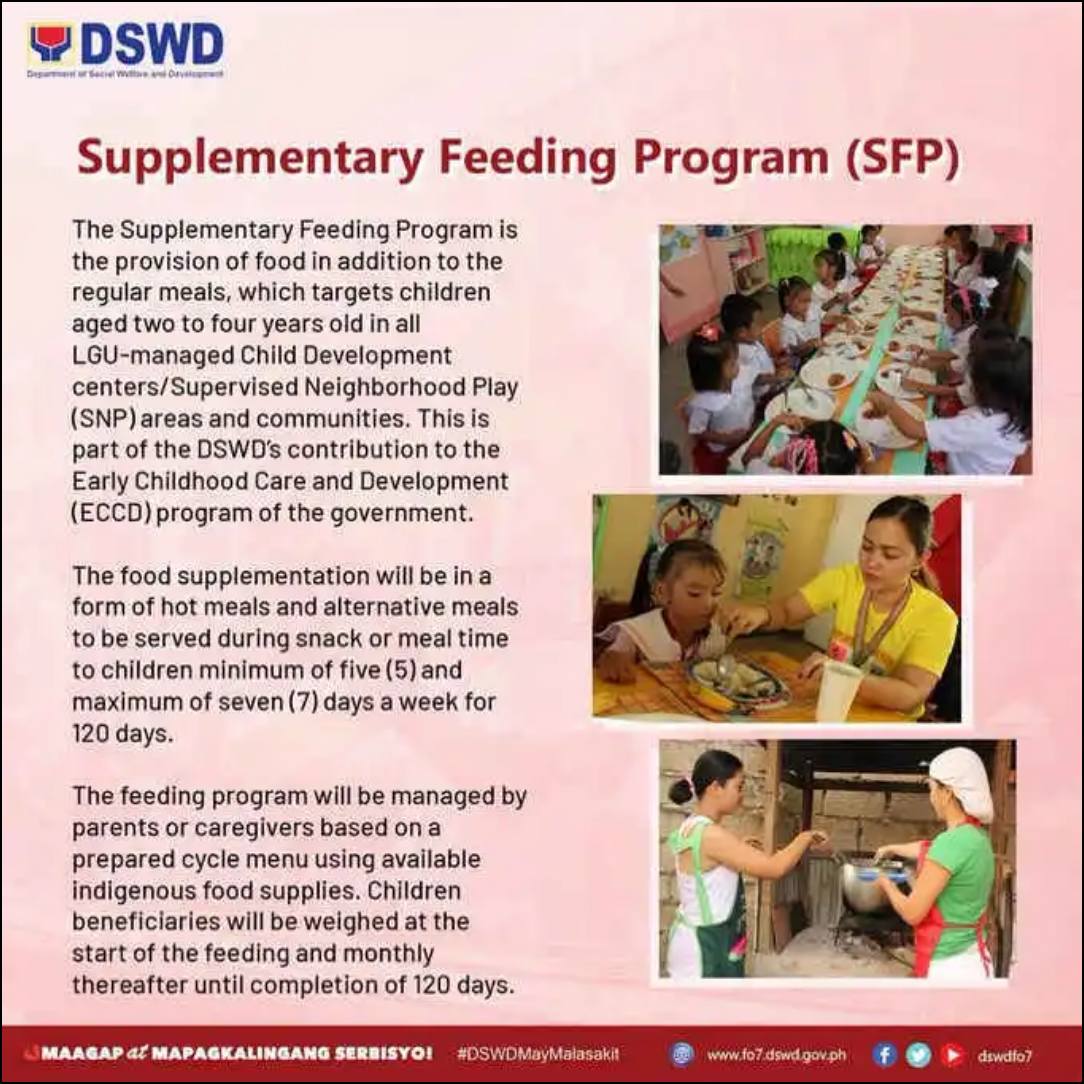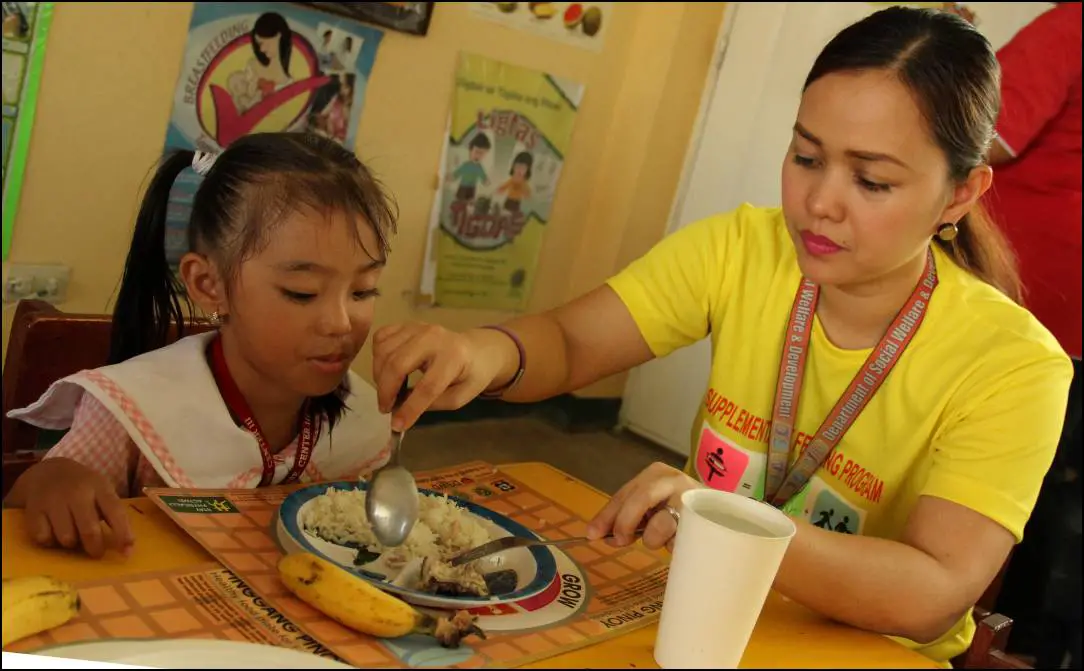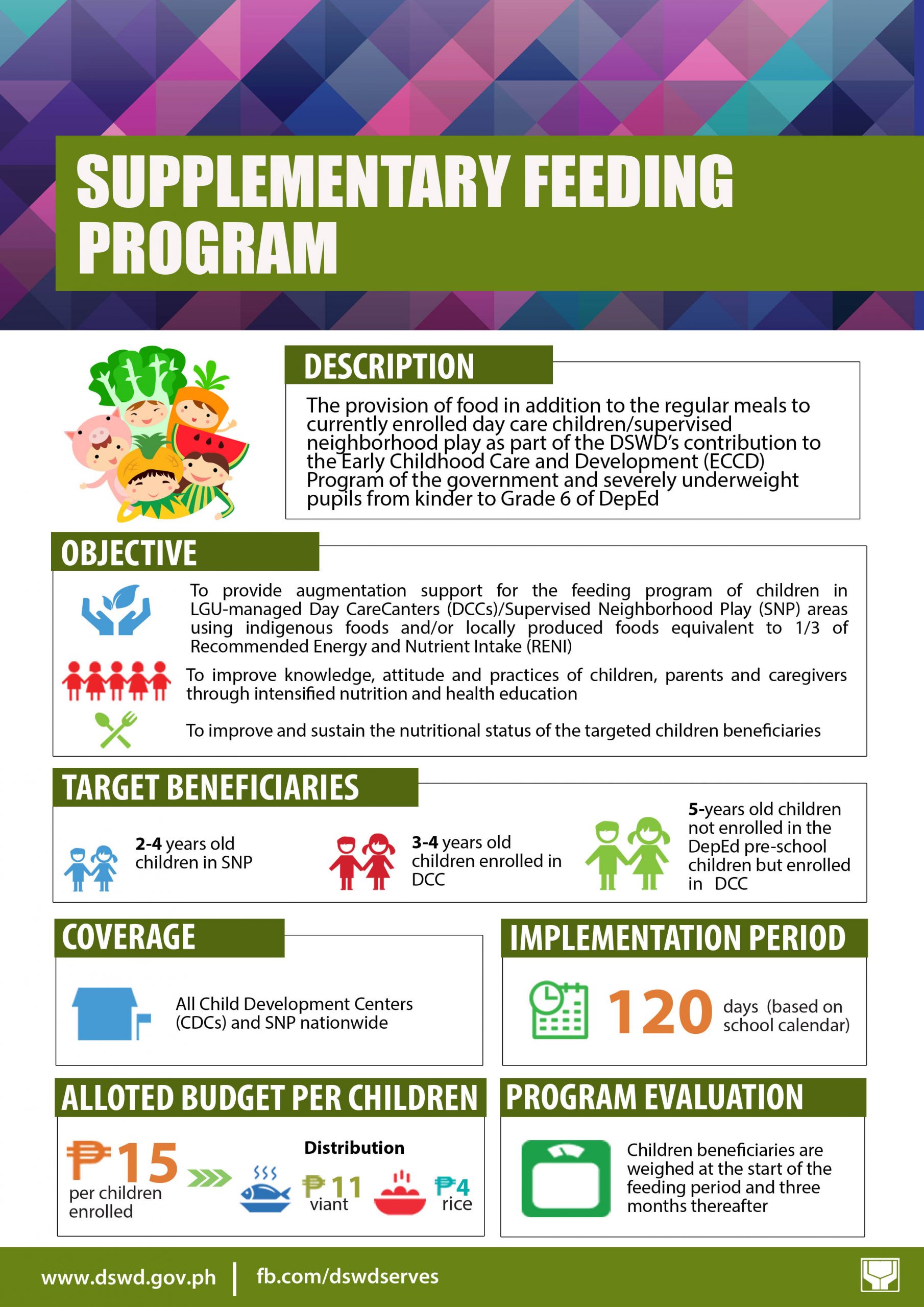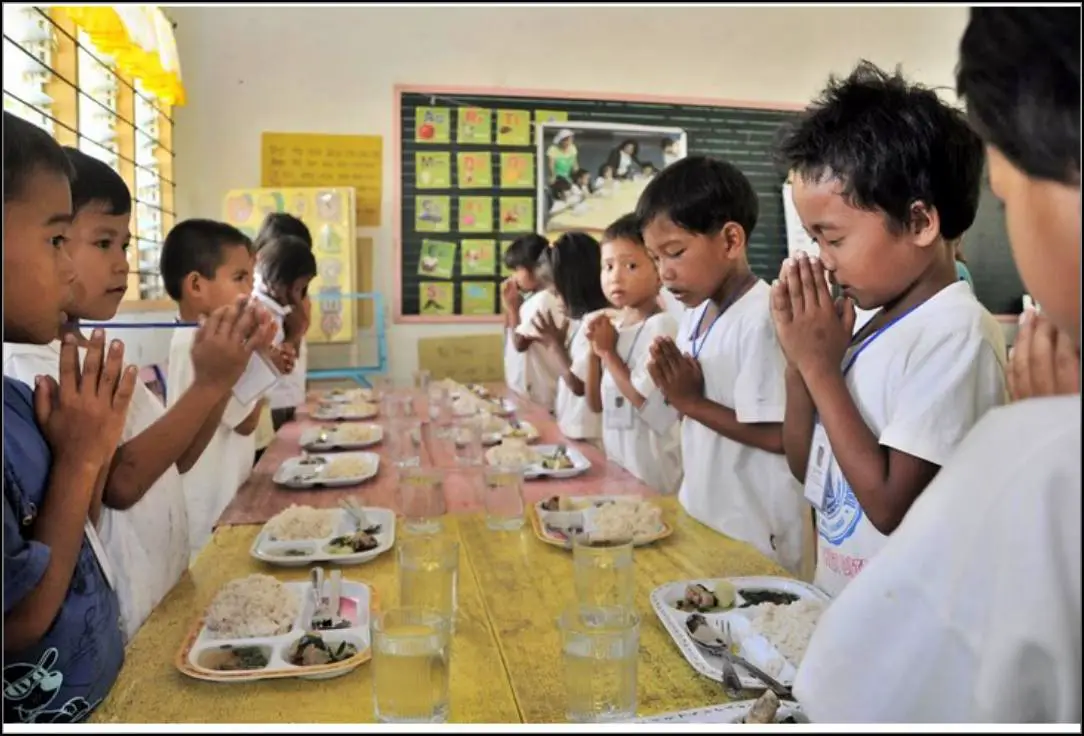The Supplementary Feeding Program (SFP) is a vital initiative of the Department of Social Welfare and Development (DSWD) in the Philippines, aimed at supporting the holistic development and well-being of young children. As part of the government’s broader Early Childhood Care and Development (ECCD) program, the SFP provides additional food to children enrolled in daycare centers alongside their regular meals. This intervention seeks to address the pressing issue of malnutrition and undernutrition among children, ensuring they receive adequate nourishment during their crucial formative years.
Also read: DSWD Program Pantawid Pamilyang Pilipino Program (4Ps): Helping Filipino Families in Need
By offering supplementary food provisions, the SFP not only helps improve the overall health and nutritional status of young children but also contributes to their cognitive, social, and emotional development. The program emphasizes the importance of proper nutrition in early childhood as a foundation for lifelong health, learning, and productivity. Through collaborative efforts with local government units, non-government organizations, and other stakeholders, the SFP strives to create a nurturing environment that fosters the growth and development of future generations in the Philippines.

Objectives of the Supplementary Feeding Program
- To offer supplemental support for the feeding initiatives in local government unit (LGU)-managed Day Care Centers and Supervised Neighborhood Play areas by utilizing indigenous and locally produced foods. These additional food provisions aim to provide at least one-third of the recommended daily energy and nutrient intake for the children.
- To enhance the knowledge, attitudes, and practices of children, parents, and caregivers through comprehensive nutrition and health education efforts. This component of the program seeks to promote healthy habits and informed decision-making among all stakeholders involved in the care and upbringing of young children.
- To improve and maintain the nutritional status of the targeted child beneficiaries over the long term. By ensuring adequate nourishment during their formative years, the Supplementary Feeding Program aims to contribute to the overall health, development, and well-being of children enrolled in day care centers and supervised play areas.
Who are the Beneficiaries of DSWD Supplementary Feeding Program?
The target beneficiaries of the Supplementary Feeding Program include:
- Children aged 2-4 years participating in Supervised Neighborhood Play (SNP) areas, where they engage in various play-based learning activities under the guidance of trained facilitators.
- Children aged 3-4 years who are enrolled in Day Care Centers (DCC), which provide early childhood care and development services, including structured learning experiences and socialization opportunities.
- Five-year-old children who, although not enrolled in the Department of Education (DepEd) preschool programs, attend Day Care Centers to receive essential early childhood care and education.

By focusing on these specific age groups, the Supplementary Feeding Program aims to address the nutritional needs of young children during their critical developmental stages, ensuring they have the necessary foundation for a healthy and productive future.
Also read: How to Apply DSWD Medical Cash Assistance in Cebu
Coverage
The Supplementary Feeding Program is implemented across all child development centers and Supervised Neighborhood Play (SNP) areas throughout the country, ensuring nationwide access to essential nutritional support.
Implementation Period
The program runs for 120 days, based on the school calendar, providing children with consistent supplementary feeding during this period.
Allotted Budget per Child
Each enrolled child receives Php 15 worth of food provisions, with Php 11.00 allocated for a viand and Php 4.00 for rice. This budget ensures that children receive nutritious meals to supplement their daily dietary requirements.
Program Evaluation
To assess the effectiveness of the Supplementary Feeding Program, children beneficiaries are weighed at the beginning of the feeding period and again after three months. This evaluation process helps monitor the progress of each child’s nutritional status, allowing for any necessary adjustments or improvements to the program, ultimately ensuring its ongoing success in promoting healthy growth and development.

Also read: How to Apply DSWD Solo Parent ID
Benefits of DSWD Supplementary Feeding Program
The Supplementary Feeding Program provides numerous benefits for the children, families, and communities it serves.
- Improved Nutrition: By providing additional nutrient-rich meals, the program helps address cases of undernutrition and malnutrition among young children, ensuring they receive adequate nourishment during their crucial developmental years.
- Enhanced Cognitive Development: Proper nutrition is essential for brain development and cognitive functioning. The program contributes to improved learning outcomes and cognitive abilities in children by supporting their nutritional needs.
- Better Health Outcomes: Well-nourished children are more resistant to illness and have stronger immune systems. The program helps reduce the prevalence of nutrition-related health issues, such as stunting, wasting, and micronutrient deficiencies.
- Increased School Attendance and Performance: Children who are well-nourished are more likely to attend school regularly and perform better academically. The program contributes to higher enrollment rates, reduced absenteeism, and enhanced educational performance.
- Strengthened Parent and Caregiver Knowledge: Through nutrition and health education components, the program empowers parents and caregivers with the knowledge and skills necessary to make informed decisions about their children’s nutritional needs and overall well-being.
- Community Empowerment: By promoting the use of indigenous and locally produced foods, the program supports local economies and encourages sustainable food production practices, fostering self-reliance and resilience within communities.
- Long-term Impact: Ensuring proper nutrition during early childhood lays a strong foundation for lifelong health, learning, and productivity. The program’s benefits extend beyond the immediate impact on the children, contributing to the development of healthier and more prosperous communities in the long run.

How to Access the Supplementary Feeding Program
To access the Supplementary Feeding Program, parents and caregivers can follow these steps:
Step 1: Identify the nearest child development center or Supervised Neighborhood Play (SNP) area in your community. These centers are typically located within schools, barangay halls, or other community facilities.
Step 2: Inquire about the program at the child development center or SNP area. Speak with the center’s staff or coordinator to learn more about the eligibility criteria, enrollment process, and program schedule.
Step 3: Gather necessary documentation, such as your child’s birth certificate or proof of age, along with any additional documents required by the center for enrollment.
Step 4: Complete the enrollment process by submitting the required documentation and filling out any necessary forms. The staff or coordinator will guide you through this process and provide assistance if needed.
Step 5: Once enrolled, ensure that your child attends the feeding program regularly to maximize its benefits. Keep track of your child’s progress and participate in any nutrition education initiatives offered by the program.
Step 6: Stay informed about updates and changes to the program by maintaining regular communication with the child development center or SNP staff and attending community meetings or events related to the Supplementary Feeding Program.
By following these steps, parents and caregivers can ensure that their children receive the valuable nutritional support provided by the Supplementary Feeding Program, promoting their overall health and well-being.
Video: DSWD’s Supplementary Feeding Program
Frequently Asked Questions
1. What is the Supplementary Feeding Program?
A: The Supplementary Feeding Program is a government initiative aimed at providing additional nutritious meals to young children in child development centers and Supervised Neighborhood Play (SNP) areas to combat undernutrition and malnutrition.
2. What is the role of nutrition education in the program?
A: Nutrition education empowers parents, caregivers, and community members with the knowledge and skills needed to make informed decisions about their children’s nutritional needs and overall well-being.
3. How can I enroll my child in the Supplementary Feeding Program?
A: To enroll, identify the nearest child development center or SNP area, inquire about the program, gather necessary documentation, complete the enrollment process, and ensure your child’s regular attendance.
4. Are there any additional support services provided alongside the feeding program?
A: Some centers and programs may offer additional services such as health check-ups, vaccinations, and parent education initiatives. Availability may vary depending on the location and resources.
5. How can I contribute to or support the Supplementary Feeding Program in my community?
A: You can support the program by volunteering your time, donating resources, participating in nutrition education initiatives, or advocating for the program’s expansion and improvement within your community.
Summary
The DSWD Supplementary Feeding Program is an initiative aimed at combating undernutrition among Filipino children. The program provides nutritious meals to disadvantaged children who suffer from undernutrition. Undernourishment is a serious problem that affects millions of Filipino children, so measures like the Supplementary Feeding Program play an important role in addressing these issues. It is crucial that we continue to prioritize the health and well-being of our youth by supporting and participating in programs like this one.
By working together to enhance nutrition through these efforts, we can give Filipino children the foundation they need to grow into healthy and strong adults.
Contact Information
Contact Number: (032) 233 0261
Email: fo7@dswd.gov.ph
Website: fo7.dswd.gov.ph